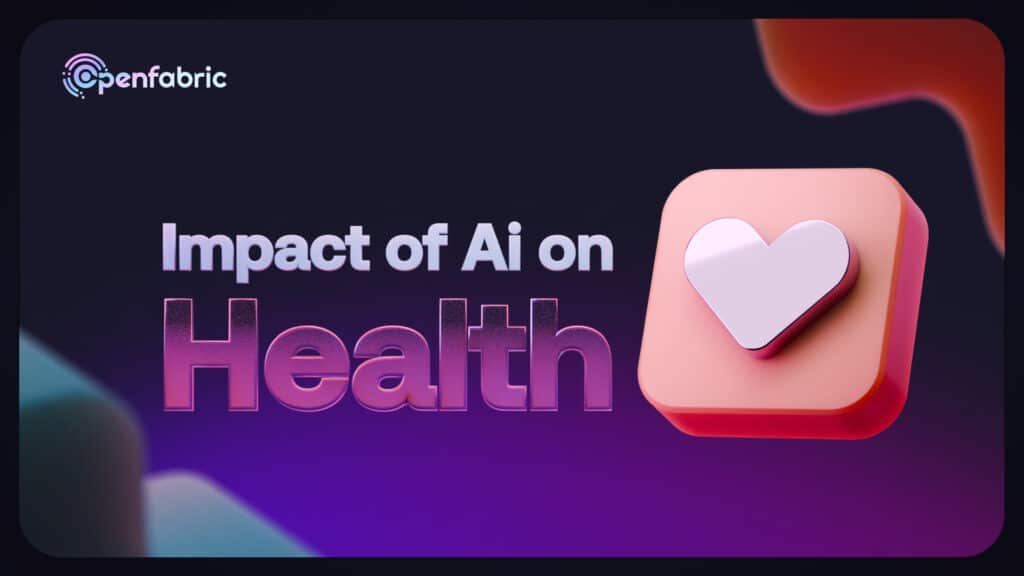
May 3, 2024 12 minutes read
Impact of Artificial Intelligence on Health

Artificial intelligence is undoubtedly the world’s next stop in terms of technological advancement. Of what importance is it without it improving key areas in our lives? The impact of artificial intelligence should be observed in important areas of our lives such as health. Openfabric has been working effectively towards improving how AI would work in our favour regarding health and healthcare.
AI is like a super-smart assistant for doctors. It helps them analyze big piles of data quickly and accurately. This means faster diagnoses and better treatment plans for patients. Imagine having a personal health advisor who knows everything about you and can suggest the best ways to keep you healthy. One big way AI is helping in health is through medical imaging. Think of X-rays, MRIs, and CT scans. AI can look at these images and spot things that human eyes might miss.
Another cool thing about AI is its ability to predict health issues before they become serious. By analyzing data from lots of patients, AI can identify patterns that might indicate a problem. This means doctors can intervene early, potentially saving lives. But AI isn’t just for doctors. It’s also making waves in the world of personal health. There are apps that use AI to track your activity, sleep, and diet. They can give you personalized advice on how to stay healthy based on your unique habits and needs.
To help us understand and learn more about how AI and health will work hand in hand, these points will be buttressed:
- Enhanced Diagnosis and Personalized Treatment
- Empowering Healthcare Professionals
- Predictive Analytics and Preventive Care
- Streamlining Administrative Processes
- Ethical Considerations and Patient Privacy
- Barriers to Adoption and Overcoming Challenges
- Future Prospects and Innovation
- Call to Action
Enhanced Diagnosis and Personalized Treatment
One of the most amazing things AI does is help doctors diagnose illnesses and create treatment plans personalized just for you. Imagine you’re feeling sick, and you go to the doctor. They run some tests and ask you a bunch of questions. Then they plug all that information into a computer, and BAM! The computer uses its AI powers to analyze everything super quickly and figure out what’s wrong with you. It’s like having a medical detective on your case, working tirelessly to crack the code of your illness. The impact of artificial intelligence in health cannot be overemphasized.
But AI doesn’t stop there. Once it figures out what’s wrong, it can also help doctors come up with the best treatment plan for you. See, everyone’s body is different, so what works for one person might not work for another. That’s where AI comes in handy. It can look at all your medical info and suggest treatments that are tailor-made just for you. It’s like having a personal health coach who knows all your secrets and wants to help you get better. One of the coolest things about AI is its ability to learn and improve over time. The more data it gets, the smarter it becomes. So, every time it helps diagnose a new illness or suggest a treatment plan, it’s learning and getting better at its job. It’s like having a really smart friend who’s always there to give you good advice.
AI helps doctors diagnose illnesses faster and create personalized treatment plans for patients. Plus, it’s always learning and getting better at its job. And let’s not forget how it’s helping researchers make new discoveries and push the boundaries of what’s possible in medicine. With AI on our side, the future of healthcare looks brighter than ever.
Empowering Healthcare Professionals
In healthcare, Artificial Intelligence (AI) is like a trusty sidekick, helping healthcare professionals save the day by lightening their workload and freeing up time for what matters most: caring for patients. Picture this: a doctor’s office filled with patients waiting to be seen. Phones are ringing, papers are piling up, and there’s a never-ending stream of emails to answer. It’s enough to make anyone’s head spin. But fear not, because AI is here to help.
One way AI lends a hand is through chatbots and virtual assistants. These handy tools can handle routine tasks like scheduling appointments, answering common questions, and even updating patient records. It’s like having a super-efficient secretary who never takes a coffee break. But AI isn’t just good at mundane tasks. It’s also a whiz at crunching numbers and analyzing data. This comes in handy for healthcare professionals who need to make complex medical decisions. With AI by their side, they can access up-to-date information and get real-time insights that help them provide the best possible care for their patients.
Take, for example, a busy emergency room doctor faced with a patient in critical condition. Time is of the essence, and every decision could mean the difference between life and death. With AI-powered tools at their fingertips, the doctor can quickly access relevant patient data. They can also review treatment options and make informed decisions on the spot. It’s like having a team of experts standing by, ready to offer guidance and support whenever needed. The impact of artificial intelligence in situations like this will be unmatched.
By automating routine tasks and streamlining administrative processes, AI gives healthcare professionals more time to spend with their patients, listening to their concerns, and providing compassionate care. It’s like lifting a weight off their shoulders and allowing them to do what they love most: making a difference in people’s lives.
Predictive Analytics and Preventive Care
Through the power of AI, healthcare providers can utilize the vast troves of patient data to anticipate health issues before they even arise, leading to early detection and intervention, ultimately fostering a healthier population.
Imagine a world where diseases are identified and tackled before they have a chance to wreak havoc. AI makes this vision a reality by analyzing mountains of patient data to uncover patterns and trends that may indicate potential health risks. It’s like having a crystal ball that can foresee health problems before they become serious.
One of the key ways AI accomplishes this is through predictive analytics. By sifting through vast amounts of data, AI algorithms can identify subtle changes in health indicators that may signal the onset of a disease. This could be anything from fluctuations in blood sugar levels to changes in sleep patterns. It’s like having a highly skilled detective combing through clues to uncover hidden dangers.
But AI doesn’t stop at prediction. It also empowers healthcare providers to take proactive measures to prevent these health issues from escalating. Armed with insights from predictive analytics, doctors can recommend targeted interventions. This will help patients stay healthy. This could include anything from lifestyle changes to preventive medications. It’s like having a guardian angel watching over your health, nudging you in the right direction before problems arise.
On Population Health Management
One area where the impact of Artificial Intelligence excels is in population health management. By analyzing data from large groups of people, AI can identify trends and patterns that may affect entire communities. For example, if AI detects a spike in flu-like symptoms in a particular area, healthcare providers can mobilize resources to prevent the spread of the illness. More like having a radar system that can detect health threats on a global scale.
But perhaps the most exciting aspect of AI-powered predictive analytics is its potential to revolutionize preventive care. By identifying individuals at high risk for certain diseases, AI enables healthcare providers to intervene early and prevent the progression of illness. This improves individual health outcomes. And also, it reduces healthcare costs and burdens on the healthcare system as a whole.
Streamlining Administrative Processes
Artificial Intelligence (AI) serves as a silent but powerful ally in healthcare, streamlining administrative processes to ensure the smooth operation of healthcare delivery systems. Through its adept abilities, AI revolutionizes mundane tasks like billing and scheduling, driving down operational costs and boosting the efficiency of healthcare organizations.
Consider the intricate process of medical billing. Traditionally, this has been a laborious and error-prone task, requiring human intervention at every step. However, with the advent of AI, this landscape is rapidly changing. AI-powered algorithms can now analyze vast amounts of data with lightning speed, accurately generating and processing billing information in a fraction of the time it would take a human. It’s like having an army of tireless accountants working around the clock to ensure that every penny is accounted for.
But the impact of Artificial Intelligence on administrative processes doesn’t stop there. It also extends to scheduling, a critical aspect of healthcare delivery. Traditionally, scheduling appointments has been a time-consuming and often frustrating attempt, with patients and providers alike grappling with long wait times and scheduling conflicts. However, with AI in the picture, this process becomes infinitely smoother. AI-powered scheduling systems can analyze patient data, provider availability, and other relevant factors to optimize appointment scheduling, minimizing wait times and ensuring that patients receive timely care. It’s like having a personal assistant who knows your schedule inside and out, ensuring that everything runs like clockwork.
Moreover, AI’s ability to automate administrative processes enables healthcare organizations to adapt more quickly to changing circumstances. Whether it’s a sudden surge in patient demand or a shift in regulatory requirements, AI-powered systems can adjust on the fly, ensuring that operations continue to run smoothly. It’s like having a versatile tool in your arsenal that can adapt to whatever challenges come your way.
Ethical Considerations and Patient Privacy
Artificial Intelligence (AI) is no doubt a powerful tool, but with great power comes great responsibility. Openfabric understands the importance of ethical AI deployment, particularly in safeguarding patient privacy, ensuring transparency, and mitigating biases in AI algorithms.
Patient privacy is paramount in healthcare, and AI must respect and protect it at all costs. Openfabric is committed to developing AI systems that adhere to strict privacy standards, ensuring that patient data is kept confidential and secure. This means implementing robust encryption protocols, limiting access to sensitive information, and obtaining explicit consent from patients before their data is used for AI analysis. It’s like building a fortress around patient data, ensuring that it remains safe from prying eyes.
Mitigating biases in AI algorithms is another key consideration for Openfabric. AI systems are only as good as the data they’re trained on, and if that data is biased, the AI will be too. Openfabric works tirelessly to identify and mitigate biases in its AI algorithms, ensuring that they deliver fair and equitable results for all patients, regardless of factors like race, gender, or socioeconomic status. This includes regularly auditing AI systems for biases, diversifying training data to ensure representation from all demographics, and incorporating fairness metrics into AI development processes. It’s like removing obstacles from the path of AI, ensuring that it can navigate the healthcare landscape with clarity and impartiality.
But ethical AI deployment doesn’t stop with Openfabric. It requires collaboration and cooperation from all stakeholders in the healthcare ecosystem. This includes healthcare providers, policymakers, and patients themselves. It’s like building a strong foundation for AI in healthcare, ensuring that it can thrive and grow while upholding the highest ethical standards. See Openfabric’s article on Ethical Considerations.
Barriers to Adoption and Overcoming Challenges
In the grand scheme of healthcare, Artificial Intelligence (AI) even with its promising nature, is not without its hurdles. Openfabric recognizes the challenges in integrating AI into healthcare systems, such as data interoperability issues and regulatory constraints, and champions collaboration to surmount these barriers.
Data interoperability is a major stumbling block on the path to AI adoption in healthcare. Different systems use different formats and standards for storing and sharing data, making it difficult for AI algorithms to access and analyze information seamlessly. Openfabric acknowledges this challenge and works towards creating interoperable data standards that allow different systems to communicate with each other effortlessly. It’s like building bridges between islands, connecting disparate data sources to create a unified ecosystem.
Regulatory constraints also pose a significant challenge to the adoption of AI in healthcare. Healthcare is a highly regulated industry, with strict rules governing everything from patient privacy to medical device approval. Navigating this regulatory landscape can be daunting, particularly for startups and innovators. Openfabric understands these challenges and advocates for regulatory frameworks that balance innovation with patient safety and privacy. It’s like clearing a path through a dense forest, creating a regulatory environment that fosters innovation while protecting the interests of patients and providers.
But overcoming these barriers requires more than just technological solutions. It requires collaboration and cooperation from all stakeholders in the healthcare ecosystem. Openfabric believes in the power of collaboration and actively works to bring together stakeholders from across the industry, including healthcare providers, policymakers, and technology developers. By fostering an environment of collaboration and knowledge sharing, Openfabric aims to break down silos and accelerate the adoption of AI in healthcare. It’s like building a coalition of allies, united in the common goal of advancing healthcare through AI.
Future Prospects and Innovation
Imagine a future where AI algorithms work tirelessly, analyzing vast amounts of medical data to provide clinicians with precise and timely insights. These algorithms, powered by machine learning techniques, continuously learn from new information, refining their ability to detect diseases at their earliest stages. With AI-enabled diagnostic tools, healthcare providers can identify conditions with unprecedented accuracy, leading to faster interventions and improved patient outcomes.
Personalized medicine, another cornerstone of AI in healthcare, holds immense promise for the future. By leveraging AI algorithms to analyze genetic data, clinicians can tailor treatments to individual patients, maximizing efficacy while minimizing side effects. This personalized approach marks a significant departure from the traditional one-size-fits-all model, ushering in an era where treatments are as unique as the patients they serve.
Moreover, AI-driven predictive analytics offer invaluable insights into population health trends, enabling proactive interventions to prevent diseases before they escalate. By analyzing diverse datasets, including electronic health records, wearable device data, and social determinants of health, AI can identify at-risk populations and recommend targeted interventions. This proactive approach not only improves health outcomes but also reduces healthcare costs by minimizing the burden of preventable diseases.
Talking about patient care, AI-powered virtual assistants are poised to revolutionize the healthcare experience. These intelligent assistants, accessible through smartphones or smart speakers, provide patients with personalized health recommendations, medication reminders, and real-time access to medical information. By empowering patients to take an active role in managing their health, AI virtual assistants promote patient engagement and adherence to treatment plans, ultimately leading to better health outcomes.
AI Enhanced Robotic Surgeries
Furthermore, AI-enhanced robotic surgery is transforming the field of surgery, enabling precision and efficiency beyond human capabilities. Surgeons can now leverage robotic systems equipped with AI algorithms to perform complex procedures with unparalleled accuracy, reducing the risk of complications and shortening recovery times. This marriage of AI and robotics represents a paradigm shift in surgical care, promising safer procedures and better outcomes for patients.
As we look ahead, the impact of Artificial Intelligence on health will only continue to grow, fueled by ongoing innovation and technological advancements. With organizations like Openfabric leading the charge in advancing AI technologies for societal benefit, the future of healthcare appears brighter than ever. By utilizing the power of AI, we can unlock new possibilities in diagnostics, treatments, and patient care, ushering in a new era of precision medicine and improved health outcomes for all.
So many articles online talk about the benefits of AI in healthcare.

